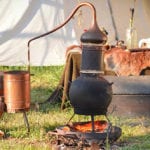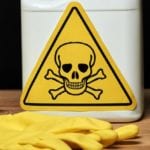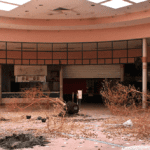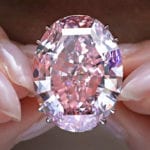 Humans
Humans  Humans
Humans  Movies and TV
Movies and TV 10 Holiday Movies Released at Odd Times of the Year
 Politics
Politics 10 Countries Where Religion and Politics Are Inseparable
 Weird Stuff
Weird Stuff 10 Freaky Times When Famous Body Parts Were Stolen
 Miscellaneous
Miscellaneous 10 Interesting Things Manufacturers Stopped Making and Why
 Gaming
Gaming 10 Funny Tutorials in Games
 History
History 10 Fascinating Little-Known Events in Mexican History
 Facts
Facts 10 Things You May Not Know about the Statue of Liberty
 Movies and TV
Movies and TV 10 Movie Adaptions That Brought Popular Songs to Life
 Health
Health 10 Miraculous Advances Toward Curing Incurable Diseases
 Humans
Humans 10 One-of-a-kind People the World Said Goodbye to in July 2024
 Movies and TV
Movies and TV 10 Holiday Movies Released at Odd Times of the Year
 Politics
Politics 10 Countries Where Religion and Politics Are Inseparable
Who's Behind Listverse?

Jamie Frater
Head Editor
Jamie founded Listverse due to an insatiable desire to share fascinating, obscure, and bizarre facts. He has been a guest speaker on numerous national radio and television stations and is a five time published author.
More About Us Weird Stuff
Weird Stuff 10 Freaky Times When Famous Body Parts Were Stolen
 Miscellaneous
Miscellaneous 10 Interesting Things Manufacturers Stopped Making and Why
 Gaming
Gaming 10 Funny Tutorials in Games
 History
History 10 Fascinating Little-Known Events in Mexican History
 Facts
Facts 10 Things You May Not Know about the Statue of Liberty
 Movies and TV
Movies and TV 10 Movie Adaptions That Brought Popular Songs to Life
 Health
Health 10 Miraculous Advances Toward Curing Incurable Diseases
Top 10 Alternative Uses For Common Items During The Apocalypse
The apocalypse could happen at any moment, so it’s best to be prepared. This list is a small assortment of techniques and tools to turn everyday household items into either deadly or extremely helpful tools of survival.
All these techniques are alternative, creative uses for these items. With the information provided in this article, we hope you can outlive the apocalypse or any sort of survival scenario that may occur.
10 Toilet Paper
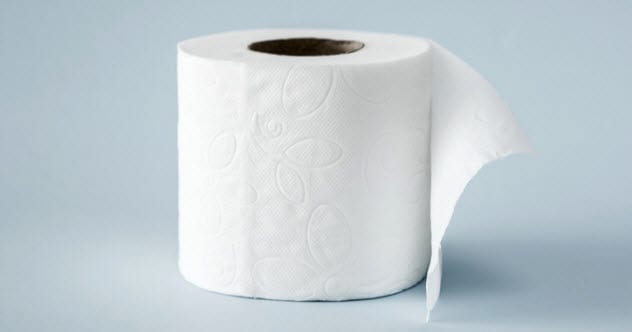
With the lack of factories making medical equipment during the apocalypse, it is important to know what can be used to replace the bandage, our most common medical tool. Turns out that toilet paper, paper towels, and tissue paper can all be used as bandages in cases of absolute emergency.
However, you need to be cautious when using these tools to treat open wounds. First, any paper product will break down and leave behind fragments whenever it comes in contact with liquid. Also, many paper products are not sterile and may cause infection if used to treat the wound.
To avoid this problem, combine the paper product with a mixture of clean water and soap. Soap is a “basic” compound, so it will kill any bacteria on it. Do not use alcohol or hydrogen peroxide as they can be a health hazard if they enter the bloodstream.
Once you dissolve the toilet paper or tissue paper in the soapy water, apply the pulp lightly to the abrasion. Do not force the pulp into the cut. Just lay it on the surface of the wound. Once the pulp is secure, wrap it in dry paper to hold it there. If the wound bleeds, start over with new paper.[1]
9 Safety Pins
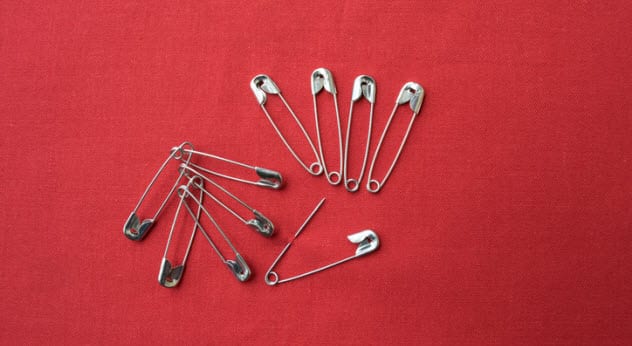
Many people know that you can pick locks with bobby pins. But there is an even better way if you have some tweezers or a little patience. Lock picking is an extremely useful skill to have during the apocalypse as it gives you access to places and resources that others may not have already claimed.
Safety pins can be better for picking locks than bobby pins. For one, safety pins are skinnier and have more flexibility. Two safety pins have a broad circular point on them, which is easier to hold when used as a tension wrench.
If you have some tweezers, bend and twist the two pins apart. Be careful not to break either the broad safety case or the flat wire circle. Then pry the sharp point of the pin down like an “L” angle—this will be your tension wrench. The pin with the big broad safety case at the end will be your pick. You may want to make a slight “V” shaped bend in it for the sake of ease while lock picking.
If you don’t have tweezers, it will take a significantly greater amount of time to complete. Once you have the lock pick constructed, you want to hold each pin by the broad side and insert the narrow side into the lock. Put the tension wrench in at the bottom of the lock and give slight pressure. Then “rake” your pick across the lock’s tumblers until it opens.[2]
8 Glass Bottles
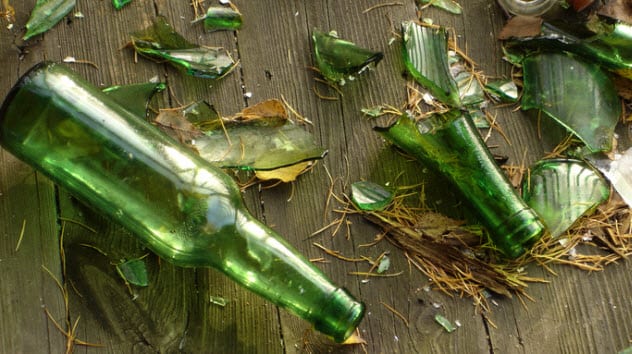
As everyone knows, glass bottles, bowls, and vases are very good for holding water and transporting liquids. However, during the apocalypse, glass may have a far more useful and ultimately deadly application.
If society were to fall into anarchy, you’d need to defend your home and family at all costs. Some of the simplest yet most effective defenses come in the form of booby-trapping your own home.
Making your home a labyrinth of deadly or dangerous traps will make it severely unappealing for looters or marauders. Not everyone has guns, knives, and other weapons lying around. Some people may not even own the tools to make these weapons.
However, many people have glass items in their homes. If you shatter glass, you instantly have a deadly weapon. But be careful when working with broken glass. If possible, use something thick and bulky to protect your hands.
Once you have a bunch of broken glass, you have many methods of using it. First is a glass carpet, where you simply lay glass all over the ground so that people cannot walk there without foot protection.[3]
If you have the means, an effective deterrent is to crush glass into dust and then construct dust bombs or pouches. Broken-down glass dust is extremely dangerous and can easily cause asphyxiation. You can also develop projectiles or pole weapons from broken glass so that you can fight at a range.
7 Shower Curtains

If you have to worry about fallout during a nuclear apocalypse, you may not have access to a radiation suit. Fortunately, you can easily devise a makeshift suit out of several items, including your shower curtain.
The most important material you’ll need is polyester or nylon. Either is good because each is waterproof. If you can find raincoats, windbreakers, shower curtains, and waterproof jacks that contain no organic fabrics, any of them would work fine.
If you find any metal or other absorbent fibers sutured into your suit, they must be removed or covered by the aforementioned materials. With the combination of plastic twine or duct tape, you may be able to tailor a wearable suit to keep fallout off and outside your body.
If you do not have a gas mask, it is best to put some fabric of any kind over your mouth and nose. Don’t reuse any fabrics exposed to fallout radiation. If you venture into an area contaminated with fallout while in your suit, make sure to wash down and remove any dirt or particles from your body when you return. This is why you must use either nylon or polyester waterproof fabrics.[4]
6 Hair Conditioner

It is a lesser-known fact that hair conditioner strongly binds to radioactive fallout particles. The chemical composition of hair conditioner makes its atomic structure bind with any particle of heavily ionized or radioactive material. Knowing this, we can prevent harm to ourselves and use the highly radioactive substance against any enemies.
All sorts of weapons using pure radiation in small doses will strictly have to be employed for the long game as the effects of radiation sickness can take several weeks to years to begin. If you have an especially concentrated batch of irradiated hair conditioner, you can do one of two things to inflict harm on another person.
First, you can poison him by slowly having him ingest the compound. Alternatively, you can find a way to get the compound mixed in with his hair. If irradiated conditioner contacts human hair, it will bind the radioactive isotopes to that person’s hair, which would constantly poison him and eventually lead to an early death.[5]
A nonhostile use for hair conditioner is to collect fallout particles to cleanse something of radiation. If you coat an object in hair conditioner, then the chemicals in the conditioner will extract most of the radioactive fallout from the object. Then you would need to thoroughly cleanse the item with water and scrubbers to remove the radioactive conditioner from the object.
5 Sugar
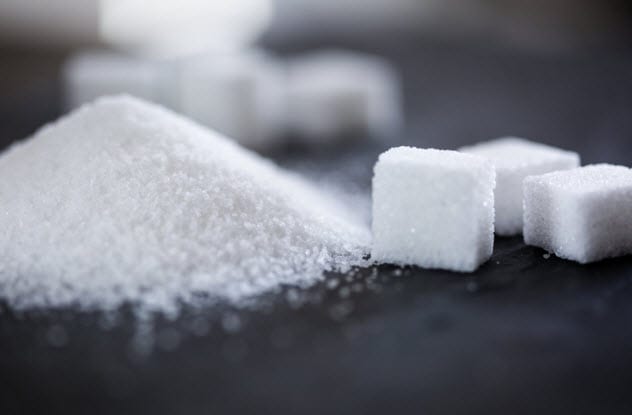
“Kill them with sugar” is truer than many think. The chemical composite of common table sugar is actually used in many formulas for low-yield exothermic reactions. Sugar is a prime ingredient of solid-form rocket fuel.[6]
When you combine table sugar with potassium nitrate, which is a salt found in many home products, then you have highly flammable, superhot burning rocket fuel. Once you have created rocket fuel, there are many possibilities.
Solid rocket fuel can be used to create a lot of heat and light quickly, which is helpful with applications such as forging, melting, camping, smiting, lighting, alarming, and signaling.
As a final use for rocket fuel, you can strap little rocket packets to arrows and then create rocket-propelled arrowheads. If you create enough rocket arrows and set them up with other trapping devices, you can easily defend your home or hunt for food.
4 Notebooks
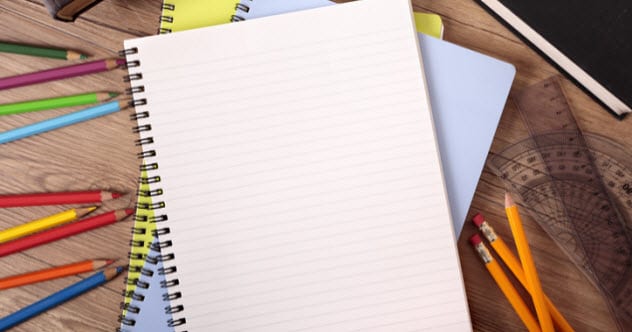
Notebooks, especially the metal-bound ones, are filled with incredibly useful items. First, the metallic spine found on most college-ruled notebooks can be removed and used for many tricks and traps. The metal coil is very flimsy and malleable, so you could use it as twine to bind two objects together.
If wrapped around with other coils, the notebook coil could be long enough to make a sturdy trip wire frame. If you had the means or the patience to dismantle and sever the metal wire, then you could also create makeshift needles, sutures, and nails from the metal fragments.[7]
The next steps can also be applied to notebooks without metal spines because the paper and cardboard covers also have many uses. You can create makeshift window shutters with the cardboard covers. As each cover already has punctured holes in it, all you have to do is weave string through the holes and attach the string to a pulley.
The paper inside the notebook also has several uses, with one of the biggest being fuel. As the notebook companies design the paper so that it won’t burn easily, the best way to set the paper ablaze is to take each page and crumple it into a ball. This allows enough oxygen to get to the fire so that it can burn the rest of the paper.
If you have too many paper balls, they can be used as an alarm system. If someone is trying to sneak through an area, littering the space with bunches of crunchy paper balls would make it much more difficult to be silent.
3 Lighters
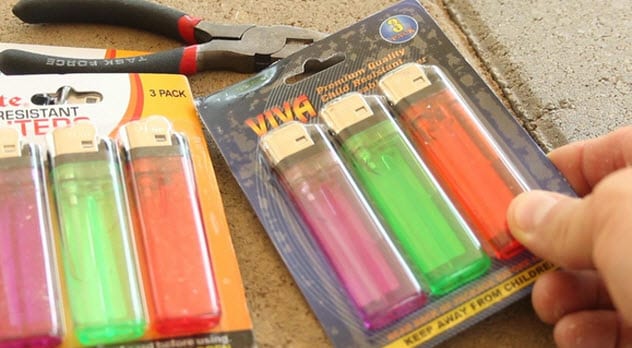
Pocket lighters have obvious uses such as providing light or fire. But there are many more tricks you can do with these little lighters. The first trick is a reminder that the lighter that burns twice as bright lasts half as long.
There is a special technique to make the flame on your lighter twice as big as it would be normally. First, you need tweezers or some patience if you’re doing this by hand. Remove the small plastic brace at the top of the lighter. (This only applies to the cheap plastic lighters.)
After you remove the top, you want to find the small lever that controls the height of the flame and push it all the way over to full. Then lift the lever up from its track, put it back to small, and then push the lever to full again.[8]
The resulting flame will be twice as big and bright compared to the original flame produced by the lighter. This is useful if you need a more powerful flame for lighting something or if you are in a very dark area and need brighter light to see.
A diversionary trick with these lighters involves creating small light flashes. There are small bars of flint that look similar to pencil lead. If you heat these up and throw them against the ground, they will explode into a bright flash. You can also use empty lighters because the flint inside them is still good. Also, the more flint they have, the brighter the flash.
2 Brooms Or Mops
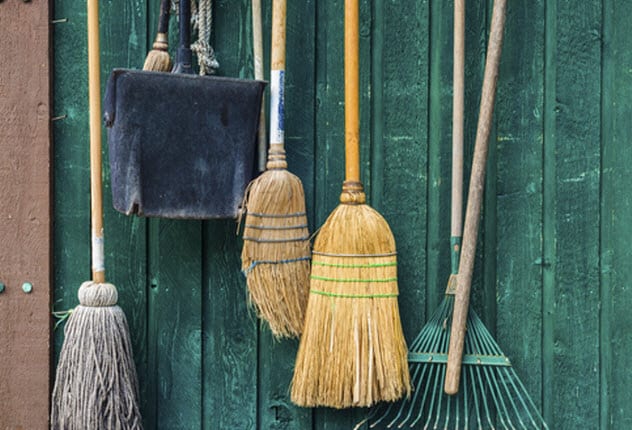
The most powerful and versatile weapon or tool on this list is the broomstick. It doesn’t matter if it’s metal or wood. A hefty wooden pole for bashing people is the very least of what these items can do.
Pole arms may become the best melee weapon once again in the aftermath of an apocalypse. Before the invention of the firearm, pole arms ruled the medieval battlefield. Best of all, you most likely already have one in your house.
The method is simple. Find your broom or mop handle, and remove the bristle end. Yes, it’s that easy. You now have a quarter staff with many different applications in a postapocalyptic world. If you’re clever, you can forge or “MacGyver” a spearhead onto the end of your pole. This increases its deadliness tenfold.[9]
If you don’t use the staff as a spear or weapon, it makes a good hiking stick or an even better trap detector. A pole arm can be effectively used as an extension of your body. You can safely put your pole through suspected traps and dangers because it is better to lose the pole rather than your arm or hand.
If you are absolutely swamped with these poles or you find some nicely sized tree branches, they can all be used for defense as well. Simply sharpen the ends, stick one end of each in the ground, line rows of them up, and you have basic wooden fortifications.
1 Silverware
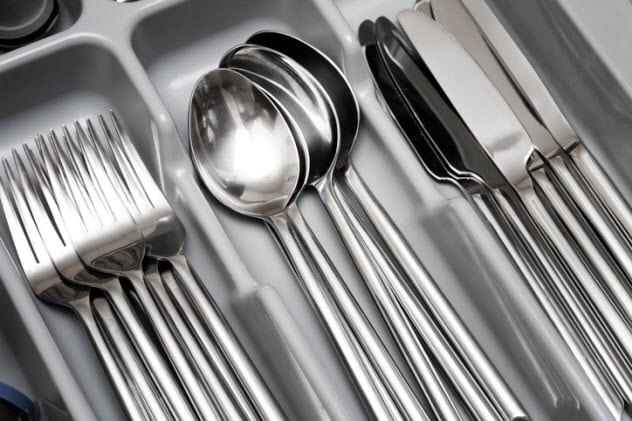
If the apocalypse rolls around, silverware can be used for much more than eating. However, if it’s made of actual silver and there is fallout radiation, then do not use it. Silver absorbs radioactive isotopes, easily binds to them, and becomes radioactive itself.
Each type of silverware has different applications during the apocalypse. Obviously, knives are practical as stabbing or defense weapons, but they become leagues deadlier if they are attached to poles and made into spears or pole arms for defense.
A steak knife or even a sharpened butter knife is flawed due to its short range. So you need to put them on an object that can extend your reach, which is extremely helpful in defeating foes during close encounters. Forks are helpful for stabbing your enemies as well as making effective trap devices.[10]
With a fork, the flat end with the prongs is easily secured into flat stationary objects. This would allow you to sharpen the handle of the fork and then put the fork in the ground, secured by its prongs, to forge a sturdy stake ready for an unknowing thug to step on and gore his foot.
Spoons reinforce your pole arm or walking sick. You take 3–5 spoons and flatten them all out. Then you bend the flattened spoon parts into right angles to the handles. Melt all the spoons together on the blunt end of your pole arm. When they have all cooled, secure the spoons with twine or small nails. Now you have a sturdy, blunt melt reinforcement to your pole arm.
I am a history and science enthusiast, keenly interested in the progress and future of mankind. I have knowledge in the fields of physics, chemistry, psychology, prehistory, medieval history, European history, and American history. I am currently attending my second year of college and working toward my AS in general science. Then I hope to get my bachelor’s in psychology. I have a strong passion for writing and teaching others about the world they live in.
For more intriguing stories about the apocalypse, check out Top 10 Times The Apocalypse Nearly Took Place and 10 Brutal Realities Of Life After The Nuclear Apocalypse.
